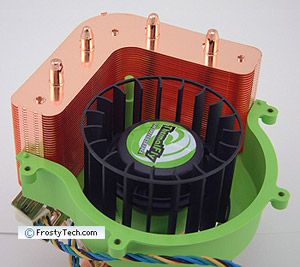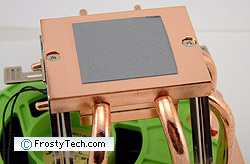FrostyTech Mk.II Synthetic Thermal Heatsink Test Results
Intel Pentium D / Extreme Edition & Quad Core class heatsinks tested
at 150W
Intel Core 2 Duo / Pentium 4
/Celeron class heatsinks tested at 85W
Results based on readings from a 30x30mm copper
interface die with 150W and 85W heat loads applied on the LGA775
version of the Mk.II Test Platform. Temperature results listed for
each heatsink were calculated by determining the rise over ambient
temperatures at time of test. Information on Frostytech's test
methodology is
available here. |
 |
|
Socket 775 compatible CPU heatsinks | |
|
manufacturer: |
model no.: |
fan
speed: |
150w
thermal test* (°c) |
85w
thermal test (°c) |
noise level (dba) |
|
|
Apack |
Zerotherm BTF90 |
|
21.8 |
12.7 |
52.1 |
| Apack |
Zerotherm BTF80 |
|
22.8 |
13.9 |
51.9 |
| Thermalfly |
F1-IACSHA |
high |
29.0 |
18.3 |
60.4 |
| Sunon |
Waturbo |
|
30.6 |
18.3 |
57.5 |
| Zalman |
CNPS7700-Cu |
high |
32.9 |
19.7 |
50.7 |
| Thermalfly
| F1-IACSHA |
low |
36.0
| 28.3 |
35.4 |
| Zalman |
CNPS7700-Cu |
low |
42.6 |
24.7 |
35.1 |
|
| | 150w
thermal test (°c)
|
85w
thermal test (°c) |
noise level (dba)
|
| *heatsinks are ranked according to the 150w thermal
test results column (rise over ambient temp.). low temperatures with low
noise levels are considered best. for reference heatsinks with
variable-speed fans, only the high speed (12v) fan test result is included
in the comparison sheet; more detailed results reside in each specific
heatsink review. |
 With a 150W heat load applied
by the Intel
LGA775 version of FrostyTech's
synthetic thermal test platform, the Thermalfly F1-IACSHA yields a rise above
ambient temperature of 29.0°C (60.4dBA) at the fans' stock speed of 3500RPM. The
CPU equivalents of this test would be an Intel Pentium D / Extreme
Edition or Core 2 Quad class chip. At the much quieter fan speed of
1300RPM, temperatures rise to 36.0°C (35.4dBA) over
ambient.
With a 150W heat load applied
by the Intel
LGA775 version of FrostyTech's
synthetic thermal test platform, the Thermalfly F1-IACSHA yields a rise above
ambient temperature of 29.0°C (60.4dBA) at the fans' stock speed of 3500RPM. The
CPU equivalents of this test would be an Intel Pentium D / Extreme
Edition or Core 2 Quad class chip. At the much quieter fan speed of
1300RPM, temperatures rise to 36.0°C (35.4dBA) over
ambient.
To
measure the effectiveness of the F1-IACSHA heatsink on a Intel Core 2
Duo class processor
we need to drop the heat load down to about 85W, for a
worst case dual-core CPU test. With 85W heat applied the Thermalfly
F1-IACSHA generates an 18.3°C rise over ambient temperature at full fan speed, and
28.3°C at its lowest fan
speed.
 On
the Intel platform the Thermalfly F1-IACSHA demonstrates that it is
well positioned as a low noise heatsink. Yet, as of this writing the
list of reference Intel LGA775 heatsinks does not include the stock Intel thermal
solution so it is difficult to say where the F1-IACSHA ultimately stands. Lacking that information
for comparison, we'll have to reserve our
comments...
On
the Intel platform the Thermalfly F1-IACSHA demonstrates that it is
well positioned as a low noise heatsink. Yet, as of this writing the
list of reference Intel LGA775 heatsinks does not include the stock Intel thermal
solution so it is difficult to say where the F1-IACSHA ultimately stands. Lacking that information
for comparison, we'll have to reserve our
comments...
Still,
on the whole the Thermalfly F1-IACSHA is good heatsink at full speed on
both AMD K8 and Intel LGA775 platforms. Obviously, the noise-to-temperature
ratio is much nicer when fan speed is dialed all the way down. I think it's safe
to say that the F1-IACSHA is great low noise thermal solution, in particular for
Athlon64 processors. Only the Zalman CNPS9500 LED and Verax Helado heatsinks post better thermal results
for an equivalent sound output on that processor family!
Related Articles:
For more reviews on the latest heatsinks and
cooling solutions, rely on FrostyTech's inventory of 350+ heatsink reviews. Here are a
few other articles that you might enjoy as well...
- Zalman Fatal1ty FS-C77 Heatsink Review
- Gigabyte 3D
Rocket II Cooler GH-PCU23-VE Heatsink
- Zalman
CNPS7700-Cu Low Noise Heatsink
- Thermalright
Ultra-120 Low Noise Heatsink
- Zalman CNPS8000
Low Noise Heatsink Review
- OCZ Tempest
Heatsink Review
- Verax Helado
PWM-T Low Noise Heatsink
- Apack ZeroTherm
BTF80 Heatsink Review
- Apack ZeroTherm
BTF90 Copper Heatsink Review
- Verax Quattro 1
Ultra-Quiet Heatsink Review
- AVC Z7U7414001
Athlon64 Socket AM2 / 939 Heatsink Review
- Cooljag SFO-Q
Socket AM2 / 939 Heatsink Review
- Zalman
CNPS9500-AM2 Socket AM2 Low Noise Heatsink
- Antazone ASC1000 Copper Heatsink Review
- Spire VertiCool
II SP601B3 AMD Athlon64 Heatsink
- Scythe Samurai
SCSM-1000 Heatsink Review
- Gigabyte 3D
Rocket Cooler-Pro PCU22-VG Heatsink Review
- Scythe Shogun
Low Noise Heatsink Review


